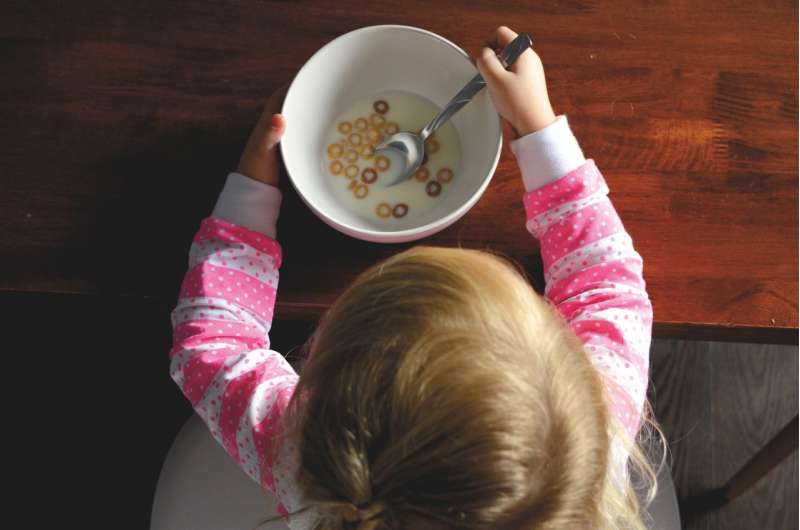Strict or neglectful parents tend to have heavier kids

The effects of different parenting styles on children's weight have been determined—and indicate parental warmth is key to a healthy weight, the International Congress on Obesity in Melbourne (18–22 October, the biennial congress of the World Obesity Federation) will hear.
The analysis of data on more than 10,000 U.K. children found that authoritarian and neglectful parenting in early childhood were linked with higher weight throughout childhood and adolescence. Both of these types of parenting are characterized by a lack of parental warmth.
"The effect of parenting style on a child's weight is often considered a taboo subject," says researcher Alexa Segal, of the Center for Health Economics & Policy Innovation at Imperial College Business School, Imperial College London, London, U.K. "However, a comprehensive understanding of the associations between parenting style and childhood and adolescent obesity has great potential to inform obesity policy and contribute to the development of more effective health and nutrition programs."
Latest figures from the National Child Measurement Program for England show that 27.7% of reception age children (4–5 years) and 40.9% of year 6 children (10–11 years) are overweight or obese.
Ms. Segal, Dr. Laure de Preux and Professor Marisa Miraldo used longitudinal data from the Avon Longitudinal Study of Parents and Children (ALSPAC) study to look at the association between parenting style during early childhood and child's weight later in childhood, in early adolescence, late adolescence and early adulthood (ages 7, 11, 13, 16 and 23, respectively).
Parenting style was divided into four categories based on questionnaires which were filled in by the parents and children. A subset of participants were also filmed interacting with their parents.
The four parenting styles examined in the study, the first of its kind, were: authoritative (parents who maintain clear boundaries but are also warm), authoritarian (parents who maintain strict discipline and show little warmth), permissive (parents are empathic but have few rules) and neglectful or uninvolved (parents who are emotionally uninvolved and have few rules).
The analysis of up to 23 years of data on 10,510 participants showed that youngsters who experienced authoritarian or neglectful styles of parenting in early childhood (age 7) were more likely to have a higher weight (taking into account their age, sex and height) than those who experienced authoritative parenting. They were about 1.5kg (3.3lb) heavier, on average. The association was seen at all ages.
The study's authors say that the lack of warmth associated with authoritarian and neglectful parenting may mean that a child's ability to self-regulate their food intake—to eat when hungry and stop eating when full—does not develop properly.
Ms. Segal explains, "Authoritarian mothers are characterized by being demanding and controlling, while having low warmth and responsiveness.
"This could lead to them not responding to their child's hunger cues by, for example, not allowing them to select a snack when hungry, and/or asserting control over the child's food intake by, for example, putting them under pressure to clean their plate when they are not hungry.
"This control means that the child does not develop their own ability to regulate their own energy intake, meaning they might overindulge when they have the ability.
"Neglectful parenting, on the other hand, may be an issue of true neglect, where no rules are given—so children might have a free rein to select unhealthy options.
"Future interventions and studies could explore whether parenting styles can be adapted to be warmer and more authoritative."
The results also suggested that permissive parenting was associated with increased weight, although the effect lessened with age. However, this result wasn't statistically significant and more evidence is needed to reach a firm conclusion.
The study's authors say that it is imperative that the influence of family life is considered when devising obesity strategies.
Ms. Segal adds, "Our findings can help inform obesity prevention and treatment programs by acting as a reminder to policymakers that modifiable risk factors for childhood obesity have significant roots within the home.
"Future childhood obesity programs could include parent support classes, where parents learn the importance of parenting style in preventing obesity. In cases where a child is already living with obesity, doctors and others providing support might consider stressing the effect that a lack of parental warmth has on a child's weight."
Professor Louise Baur, President of the World Obesity Federation and Chair of Child & Adolescent Health, University of Sydney, NSW, Australia, comments, "This study highlights the fundamental importance of parents in raising healthy children. The world today often makes it difficult for children and families to eat well, be physically active, sleep well and cope with stress. Parents who are able to set appropriate limits for their child, while bringing warmth and sensitivity to the relationship, may be better able to help their child be as healthy as possible."


















